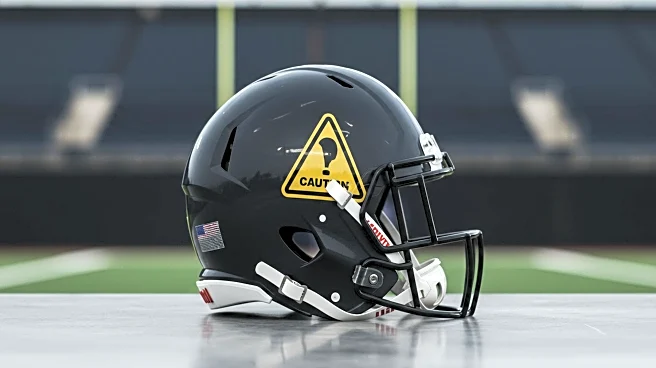What is the story about?
What's Happening?
The Michigan Wolverines have been penalized for their involvement in a sign-stealing scandal that has been a major topic in college football. The NCAA has imposed several penalties, including a two-game suspension for the upcoming season, a 10-year show-cause penalty for former head coach Jim Harbaugh, and an eight-year show-cause penalty for Connor Stalions, the alleged sign-stealer. Additionally, former Michigan quarterback Denard Robinson will face a three-year show-cause penalty. The program will also experience a 25% reduction in official visits for the 2025-26 season and a 14-week probation period for recruiting communications during a four-year probationary period. Despite these penalties, the Wolverines have not had to sacrifice any historical success, contrasting sharply with the severe penalties faced by the USC Trojans in the Reggie Bush saga.
Why It's Important?
The penalties imposed on the Wolverines highlight the NCAA's approach to handling infractions within college sports. While the sanctions send a message about the financial impact of violations, the relatively lenient punishment compared to past cases, such as USC's, raises questions about consistency and fairness in NCAA rulings. The Wolverines' ability to maintain their program's success despite the penalties suggests that the consequences may not significantly deter future infractions. This situation underscores the ongoing debate about the effectiveness and equity of NCAA enforcement policies, potentially influencing future decisions and reforms in college sports governance.
What's Next?
The Wolverines will begin the next season without head coach Sherrone Moore for the first game, as part of the penalties. The program will need to navigate the restrictions on recruiting and official visits during their probationary period. The NCAA's handling of this case may prompt discussions among stakeholders about the need for more consistent and transparent enforcement policies. College sports programs may also reassess their compliance strategies to avoid similar infractions and penalties.
Beyond the Headlines
The disparity in penalties between the Wolverines and the USC Trojans highlights potential flaws in the NCAA's punishment system, which could lead to calls for reform. The perception of leniency in the Wolverines' case may encourage other programs to weigh the risks of infractions against the potential benefits, potentially affecting the integrity of college sports. This situation may also influence public and media scrutiny of NCAA decisions, impacting the organization's reputation and authority.

















